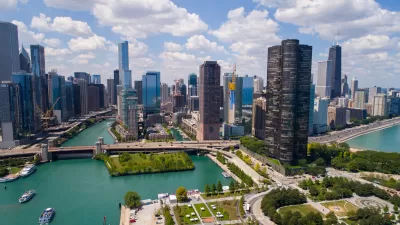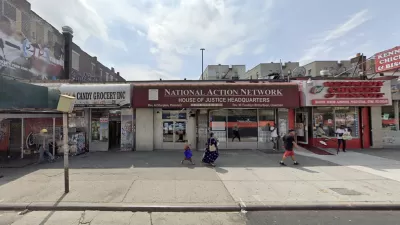A new 85-unit apartment building in Harlem shows that affordable housing and green building practices can go hand in hand.
"Situated on West 153rd Street, David & Joyce Dinkins Gardens offers 85 units of affordable housing in addition to a 25,000 square foot youth center and a community garden. Jonathan Rose Companies and Harlem Congregations for Community Improvement developed the $19.5 million community to help repair the "physical, economic, cultural, and spiritual fabric of the neighborhood." Towards these goals the project has kept costs low while integrating a noble set of social and environmental ideals governed by principles of diversity, interdependence, and environmental responsibility."
"Dinkins Gardens utilizes an impressive array of forward-thinking green strategies to promote energy efficiency, conservation, and quality of life while taking advantage of the economic benefits of of green architecture to keep living costs down for residents. The structure is composed of nontoxic, recycled, and locally made materials and features south-facing solar shades and a green roof, both of which help regulate temperature. The roof also has a rainwater harvesting system that funnels water from the roof into storage tanks for the garden's irrigation. Inside, efficient energy systems abound with copious use of natural daylighting, energy star rated appliances and light fixtures, and a high efficiency boiler.
With recent news that green buildings are becoming increasingly profitable, it's great to see projects like this that keep costs down while balancing a sound social and environmental approach. Encouraging vital, eco-friendly communities such as this is a sure step towards ensuring a sustainable future."
FULL STORY: DINKINS GARDENS: Harlem’s First Affordable Green Housing

Planetizen Federal Action Tracker
A weekly monitor of how Trump’s orders and actions are impacting planners and planning in America.

Maui's Vacation Rental Debate Turns Ugly
Verbal attacks, misinformation campaigns and fistfights plague a high-stakes debate to convert thousands of vacation rentals into long-term housing.

Restaurant Patios Were a Pandemic Win — Why Were They so Hard to Keep?
Social distancing requirements and changes in travel patterns prompted cities to pilot new uses for street and sidewalk space. Then it got complicated.

In California Battle of Housing vs. Environment, Housing Just Won
A new state law significantly limits the power of CEQA, an environmental review law that served as a powerful tool for blocking new development.

Boulder Eliminates Parking Minimums Citywide
Officials estimate the cost of building a single underground parking space at up to $100,000.

Orange County, Florida Adopts Largest US “Sprawl Repair” Code
The ‘Orange Code’ seeks to rectify decades of sprawl-inducing, car-oriented development.
Urban Design for Planners 1: Software Tools
This six-course series explores essential urban design concepts using open source software and equips planners with the tools they need to participate fully in the urban design process.
Planning for Universal Design
Learn the tools for implementing Universal Design in planning regulations.
Heyer Gruel & Associates PA
JM Goldson LLC
Custer County Colorado
City of Camden Redevelopment Agency
City of Astoria
Transportation Research & Education Center (TREC) at Portland State University
Jefferson Parish Government
Camden Redevelopment Agency
City of Claremont





























